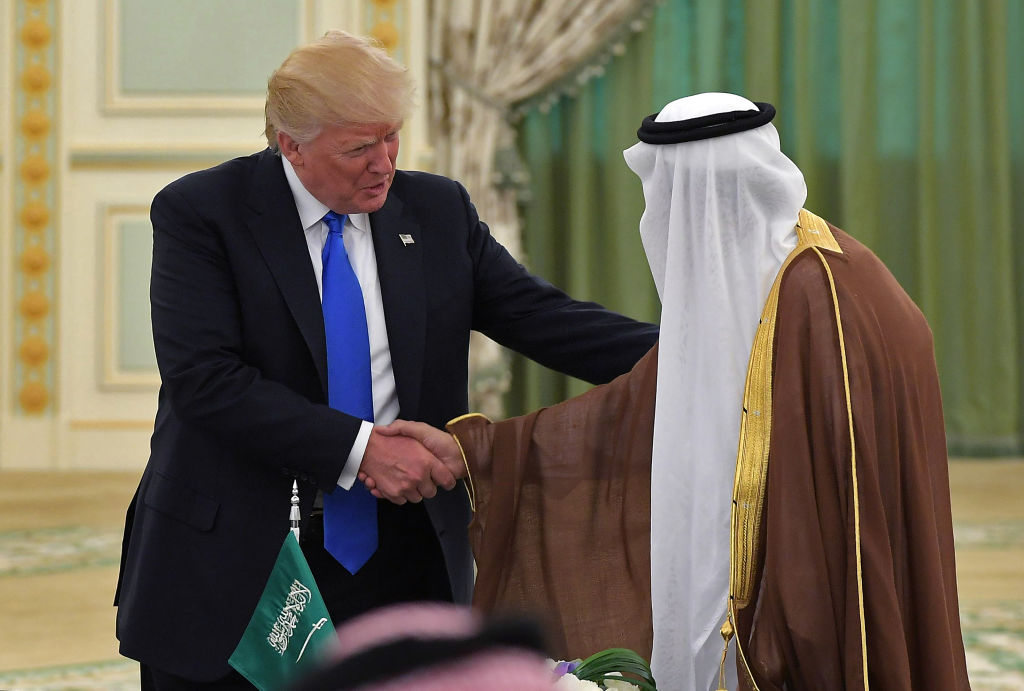Trump's $110 billion arms sale to Saudi Arabia was all smoke and mirrors, defense expert argues


A free daily email with the biggest news stories of the day – and the best features from TheWeek.com
You are now subscribed
Your newsletter sign-up was successful
The centerpiece of President Trump's friendly trip to Saudi Arabia was the signing of arms deals purportedly worth $110 billion now and up to $350 billion over 10 years. On Monday, the Defense Security Cooperation Agency reported that the State Department had signed off on a chunk of that deal, $1.4 billion worth of "possible" military sales to the Saudis — $662 million for radar systems, ammunition, trucks, and technical support, and $750 million for military training programs. The key word is "possible," argues Bruce Riedel, a veteran former CIA officer and current senior fellow at the Brookings Institution. For the most part, "there is no deal. It's fake news." Riedel explains:
I've spoken to contacts in the defense business and on the Hill, and all of them say the same thing: There is no $110 billion deal. Instead, there are a bunch of letters of interest or intent, but not contracts. Many are offers that the defense industry thinks the Saudis will be interested in someday. ... The Defense Security Cooperation Agency, the arms sales wing of the Pentagon, calls them "intended sales." None of the deals identified so far are new, all began in the Obama administration. ... What the Saudis and the administration did is put together a notional package of the Saudi wish list of possible deals and portray that as a deal. Even then the numbers don't add up. It's fake news. [Riedel, Brookings Institution]
Moreover, Riedel adds, even if the Saudis agreed to buy $110 billion worth of weapons, they couldn't pay for them, given the low oil prices. The Saudis are struggling to make payments on a huge 2012 deal negotiated by then-Defense Secretary Robert Gates, he said, and that only went through because the Obama administration also signed a big deal with Israel. Saudi Arabia will buy billions worth of munitions, because "the Royal Saudi Air Force needs more munitions to continue the air bombardment of the Arab world's poorest country," Yemen, Riedel says, but "you will know the Trump deal is real when Israel begins to ask for a package to keep the Israeli Defense Forces' qualitative edge preserved."
Riedel isn't the only skeptic of the new Saudi arms package, though clearly all parties involved believe talking it up is good for business. You can read his entire argument at the Brookings Institution.
The Week
Escape your echo chamber. Get the facts behind the news, plus analysis from multiple perspectives.

Sign up for The Week's Free Newsletters
From our morning news briefing to a weekly Good News Newsletter, get the best of The Week delivered directly to your inbox.
From our morning news briefing to a weekly Good News Newsletter, get the best of The Week delivered directly to your inbox.
A free daily email with the biggest news stories of the day – and the best features from TheWeek.com
Peter has worked as a news and culture writer and editor at The Week since the site's launch in 2008. He covers politics, world affairs, religion and cultural currents. His journalism career began as a copy editor at a financial newswire and has included editorial positions at The New York Times Magazine, Facts on File, and Oregon State University.
-
 The environmental cost of GLP-1s
The environmental cost of GLP-1sThe explainer Producing the drugs is a dirty process
-
 Greenland’s capital becomes ground zero for the country’s diplomatic straits
Greenland’s capital becomes ground zero for the country’s diplomatic straitsIN THE SPOTLIGHT A flurry of new consular activity in Nuuk shows how important Greenland has become to Europeans’ anxiety about American imperialism
-
 ‘This is something that happens all too often’
‘This is something that happens all too often’Instant Opinion Opinion, comment and editorials of the day
-
 TikTok secures deal to remain in US
TikTok secures deal to remain in USSpeed Read ByteDance will form a US version of the popular video-sharing platform
-
 Unemployment rate ticks up amid fall job losses
Unemployment rate ticks up amid fall job lossesSpeed Read Data released by the Commerce Department indicates ‘one of the weakest American labor markets in years’
-
 US mints final penny after 232-year run
US mints final penny after 232-year runSpeed Read Production of the one-cent coin has ended
-
 Warner Bros. explores sale amid Paramount bids
Warner Bros. explores sale amid Paramount bidsSpeed Read The media giant, home to HBO and DC Studios, has received interest from multiple buying parties
-
 Gold tops $4K per ounce, signaling financial unease
Gold tops $4K per ounce, signaling financial uneaseSpeed Read Investors are worried about President Donald Trump’s trade war
-
 Electronic Arts to go private in record $55B deal
Electronic Arts to go private in record $55B dealspeed read The video game giant is behind ‘The Sims’ and ‘Madden NFL’
-
 New York court tosses Trump's $500M fraud fine
New York court tosses Trump's $500M fraud fineSpeed Read A divided appeals court threw out a hefty penalty against President Trump for fraudulently inflating his wealth
-
 Trump said to seek government stake in Intel
Trump said to seek government stake in IntelSpeed Read The president and Intel CEO Lip-Bu Tan reportedly discussed the proposal at a recent meeting
